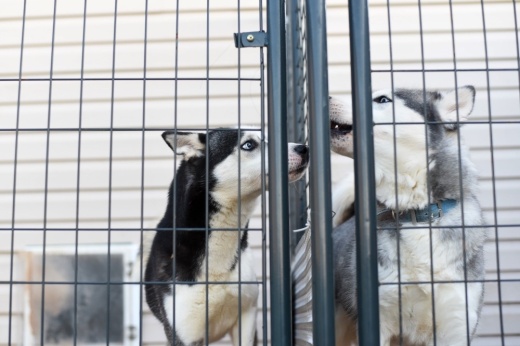The policies offer a step toward clarifying the shelter’s stance on euthanization and sterilization but are not a foolproof solution, city staff said.
“You can have all the policies in the world, and you can have all these things that try to guide, but if you hire unethical people ... these policies aren’t going to mean anything,” interim Shelter Manager Danny Cornelius said at the March 8 Animal Advisory Board meeting.
Cornelius and interim co-manager Cindy King have worked to run the shelter after the firing of five shelter employees and former Shelter Manager Don Specks following an investigation by the city of Sugar Land, Sugar Land Communications Director Doug Adolph said. Cornelius is employed by the Sugar Land Police Department, and King is employed by the Sugar Land Fire Department.
Sugar Land's animal shelter came under fire in 2022 after the city reported that close to 40 animals had been euthanized without authorization. According to the city's report, employees said the animals were killed due to "aggressive behavior" or medical diagnoses.
Updated policy
One key difference in the new euthanization policy is that the shelter will not consider euthanization on the basis of “capacity care,” or the practice of killing an animal based on shelter capacity.
“It is the policy of the city of Sugar Land that an animal shall not be euthanized because the city's animal shelter has insufficient capacity to care for the animal or because the animal has been a resident of the animal shelter for an extended period of time,” the new euthanization policy states.
Under the new policy, there are two instances of permissible euthanization, which are that an animal must suffer mentally, emotionally or physically with a poor prognosis for recovery, or with anticipated protracted painful recovery from injury or illness; or if it is deemed to pose an unacceptable danger to other animals, itself or humans. These are categorized as “medical” and “behavioral” euthanizations, said Dawn Steph, Sugar Land's director of environmental and neighborhood services. During the March 8 meeting, Steph acted as a staff liaison to the animal advisory board.
Some discussion was held during the meeting as to whether to include certain phrases, such as "life-affirming options," but were rejected for redundancy. Final decisions for euthanizations rest with the animal shelter management team and are to be carried out by a licensed veterinarian, according to the policy.
According to the document, Sugar Land requires a three-business-day stray hold for animals not microchipped, and a five-business-day stray hold for animals with a microchip. Once the stray hold has been completed, surgery “should be scheduled as soon as possible to spay or neuter the animal.” According to city staff, “terminal spays,” or abortions carried out on pregnant animals, are acceptable and will be conducted unless the animal is in active labor.
Not approved during the March 8 meeting were a new round of standard operating procedures. While policies provide a “high-level overview,” standard operating procedures outline appropriate courses of action during various scenarios, city officials said.
Steph said the city is still in the process of completing standard operating procedure documents for both sterilization and euthanization events. Both documents are anticipated to be as long as 150 pages, which is why they were not completed and presented at the March 8 meeting, Steph told the animal advisory board. No completion date was provided at the meeting.
Over capacity
Despite these new procedures, the animal shelter remains understaffed and well over capacity for dogs. The Sugar Land Animal Shelter, called “Barksburg,” has 23 cats and 45 dogs, according to the latest city reports presented at the March 8 meeting. The shelter’s latest expansion in 2017 raised the maximum capacity to 56 cats and 31 dogs, according to the shelter’s website.
No strategy was presented at the March 8 meeting for addressing capacity issues, except to continue marketing for both volunteers and adoptions, but Adolph provided a statement on the city's $90.76 million 2019 bond program, which included $6.6 million for a new animal shelter.
"Sugar Land voters approved $6.6 million on Nov. 5, 2019, to fund the design and construction of a new animal shelter to address projected animal capacity from the city’s growth," Adolph said. "Following approval of the bond election, City Council created a schedule to implement voter-approved projects, including the animal shelter. Due to financial constraints caused by the COVID[-19] pandemic, the schedule for the delivery of the projects was expanded from three to five years. Drainage and public safety projects were front-loaded in the schedule to address citizen priorities."
Construction on the animal shelter is set to begin in 2025, but is dependent on City Council approving a higher tax rate to fund the project as well as community fundraising contributions, Adolph said. He also said the city is considering regionalizing the shelter.
"A year ago, City Council directed staff to study regionalization options for the shelter," he said. "The future of the voter-approved shelter will depend on the outcome of these studies and community fundraising efforts."
At present, shelter officials are still searching for three positions: an administrative coordinator, a full-time kennel technician and a part-time kennel technician.
The full board meeting may be found online at the city of Sugar Land YouTube channel. The animal advisory board meets once a month. The full policy on euthanization may be found online within the animal advisory board’s March 8 agenda here. A sterilization policy was also approved on March 8 and may be found here.





